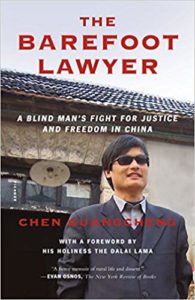 European foreign ministers should endorse Dutch plans to create targeted EU sanctions for human rights abusers when they meet next week, say 90 human rights and civil society groups, including Fair Trials, Reporters Without Borders, Human Rights Fist, Transparency International, and the National Endowment for Democracy. An EU ‘Global Magnitsky’ Act would be a “critical tool to combat impunity and defend human rights,” they said in a letter Wednesday, referring to similar laws in the US named after Russian activist, Sergei Magnitsky, EU Observer reports.
European foreign ministers should endorse Dutch plans to create targeted EU sanctions for human rights abusers when they meet next week, say 90 human rights and civil society groups, including Fair Trials, Reporters Without Borders, Human Rights Fist, Transparency International, and the National Endowment for Democracy. An EU ‘Global Magnitsky’ Act would be a “critical tool to combat impunity and defend human rights,” they said in a letter Wednesday, referring to similar laws in the US named after Russian activist, Sergei Magnitsky, EU Observer reports.
“As we have seen in countries that have enacted and utilized ‘Global Magnitsky’ sanctions laws to date, a global human rights and anti-corruption sanctions program can serve as a vital addition to the diplomatic and legal toolkit essential to upholding human rights and the rule of law,” the letter states:
In a relatively short period of time, governments such as those in the United States and Canada have used their human rights and anticorruption sanctions laws to fight impunity for some of the world’s most heinous crimes in countries from Myanmar to Saudi Arabia. A similar tool will provide the EU with the ability to shine a spotlight on and compel changes of behavior in some of the world’s worst human rights violators. Robust implementation also has the potential to deter would-be kleptocrats and those that would use violence to silence dissent and maintain their grip on power.
 The Post’s Jennifer Rubin writes: Sens. Robert Menendez (D-N.J.) and Bob Corker (R-Tenn.) expect to hear back from President Trump. “The recent disappearance of Saudi journalist and Washington Post columnist Jamal Khashoggi suggests that he could be a victim of a gross violation of internationally recognized human rights . . . Therefore, we request that you make a determination on the imposition of sanctions pursuant to the Global Magnitsky Human Rights Accountability Act with respect to any foreign person responsible for such a violation related to Mr. Khashoggi.”
The Post’s Jennifer Rubin writes: Sens. Robert Menendez (D-N.J.) and Bob Corker (R-Tenn.) expect to hear back from President Trump. “The recent disappearance of Saudi journalist and Washington Post columnist Jamal Khashoggi suggests that he could be a victim of a gross violation of internationally recognized human rights . . . Therefore, we request that you make a determination on the imposition of sanctions pursuant to the Global Magnitsky Human Rights Accountability Act with respect to any foreign person responsible for such a violation related to Mr. Khashoggi.”
There is no escaping the Saudi government’s responsibility for this horrific act, adds Tamara Cofman Wittes, a Senior Fellow in Foreign Policy with Brookings’ Center for Middle East Policy. Sanctions against culpable individuals imposed under the Global Magnitsky Act, though important, are insufficient to address this reality, or to address the crisis in U.S.-Saudi relations it created. To resolve this bilateral crisis, the Saudi government—in the person of MBS or someone else—must take responsibility, pay the price of these actions, and demonstrate a new path, she argues.
 Sanctions are also required to attract the attention of China’s ruling Communist Party, says Chen Guangcheng, an activist who has been blind since childhood. Silenced for so long, many Chinese people see financial pain as the only language the regime will understand, he writes for The Washington Post. Indeed, some netizens have even suggested that the United States use its Global Magnitsky Act to freeze the overseas assets of corrupt Chinese officials, adds the author of “The Barefoot Lawyer: A Blind Man’s Fight for Justice and Freedom in China.”
Sanctions are also required to attract the attention of China’s ruling Communist Party, says Chen Guangcheng, an activist who has been blind since childhood. Silenced for so long, many Chinese people see financial pain as the only language the regime will understand, he writes for The Washington Post. Indeed, some netizens have even suggested that the United States use its Global Magnitsky Act to freeze the overseas assets of corrupt Chinese officials, adds the author of “The Barefoot Lawyer: A Blind Man’s Fight for Justice and Freedom in China.”
CSIS adds: Please join the Human Rights Initiative for reflections from U.S. Senator Ben Cardin (D-MD), the author of the Global Magnitsky Act. He will be followed by a panel examining the impact of the Global Magnitsky sanctions, opportunities to improve implementation, and how the sanctions fit within financial sector approaches to human rights and corruption. These sanctions enable targeted designations based on human rights abuse and corruption around the world, and have been imposed on officials and companies in a number of recent high profile situations, including Myanmar, Democratic Republic of Congo, and Nicaragua.
Keynote Speaker
U.S. Senator Ben Cardin (D-MD)
Panel
Robert Berschinski, Senior Vice President Policy at Human Rights First
Robert Peri, Director of US Sanctions at Citibank
Joshua White, Director of Policy and Analysis at The Sentry







